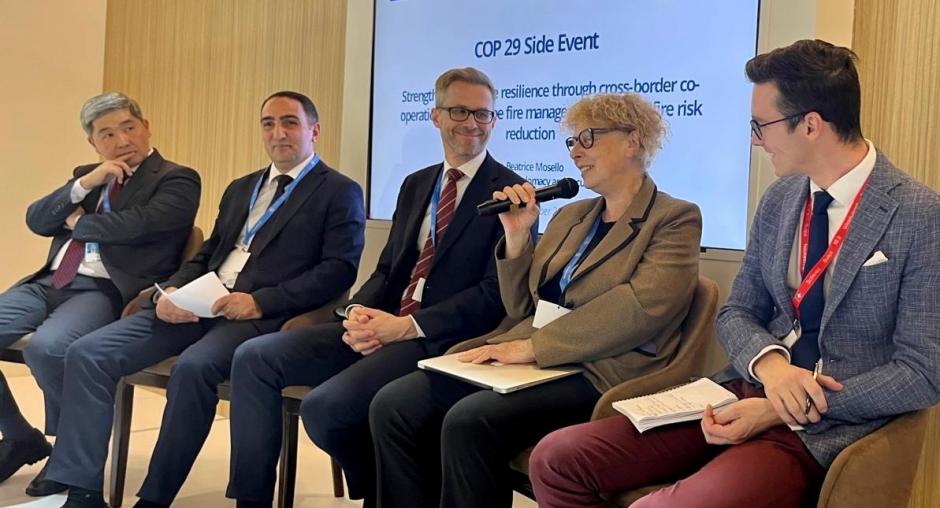Report on Georgia-Azerbaijan co-operation for reducing climate-related security risks through joint landscape fire management launched at COP29 in Baku

The report “Co-operation in North-west Azerbaijan and Eastern Georgia”, which tackles joint co-operation in the areas of climate change, landscape fire management and wildfire risk reduction, was officially launched on 19 November during a side event at the 29th United Nations Climate Change conference (COP29) in Baku. Jointly developed by the Organization for Security and Co-operation in Europe (OSCE) and the think tank adelphi, the report highlights approaches for addressing shared climate-related challenges and identifies entry-points for strengthening cross-border co-operation between two pilot municipalities, Dedoplistskaro in Georgia and Zagatala in Azerbaijan.
Building on the findings of the earlier report “Regional Consultation for the South Caucasus – Azerbaijan and Georgia”, published in 2021, the study draws on a bilateral workshop in Tbilisi on 26 October 2023 and consultations with national and local stakeholders in Azerbaijan and Georgia including in the two pilot municipalities in April 2024. It also benefitted from the expertise provided by the Global Fire Monitoring Center (GFMC).
During the launch event at COP29, speakers emphasized the importance of cross-border collaboration in tackling the growing risks posed by climate change and wildfires. As Eastern Georgia and North-West Azerbaijan share similar ecological characteristics and wildfire vulnerabilities, the report outlines strategies for community engagement, capacity-building for local and national disaster response, nature-based solutions and risk reduction measures designed to enhance resilience in both countries.
"This report is a testament to the importance of co-operation," said Ambassador Dzhusupov, Co-ordinator of OSCE Economic and Environmental Activities (OCEEA) during his statement at the event. "Georgia and Azerbaijan are demonstrating how countries can come together to address the impacts of climate change while protecting shared ecosystems and communities. The OSCE stays committed to supporting partnerships to reduce risks stemming from climate change."
The side event featured a key note presentation by adelphi, followed by a panel discussion which included representatives from the Ministry of Emergency Situations of Azerbaijan and the Ministry of Environmental Protection and Agriculture of Georgia, as well as government representatives from Sweden and Switzerland.
The report provides the basis for the next steps of the project including the development of a joint co-operation strategy and implementation plan followed by pilot activities to operationalize cross-border co-operation between the two countries on wildfire risk reduction in the context of strengthening climate resilience.
This report was prepared within the framework of the OSCE extra-budgetary project “Strengthening responses to security risks from climate change in South-Eastern Europe, Eastern Europe, the South Caucasus, and Central Asia”, which is implemented by OCEEA in partnership with adelphi and in close collaboration with the OSCE field operations. The project is funded by Andorra, Austria, Czech Republic, Finland, France, Germany, Italy, Japan, Liechtenstein, Luxembourg, Norway, Poland, Slovenia, Sweden, Switzerland, United Kingdom and United States.
